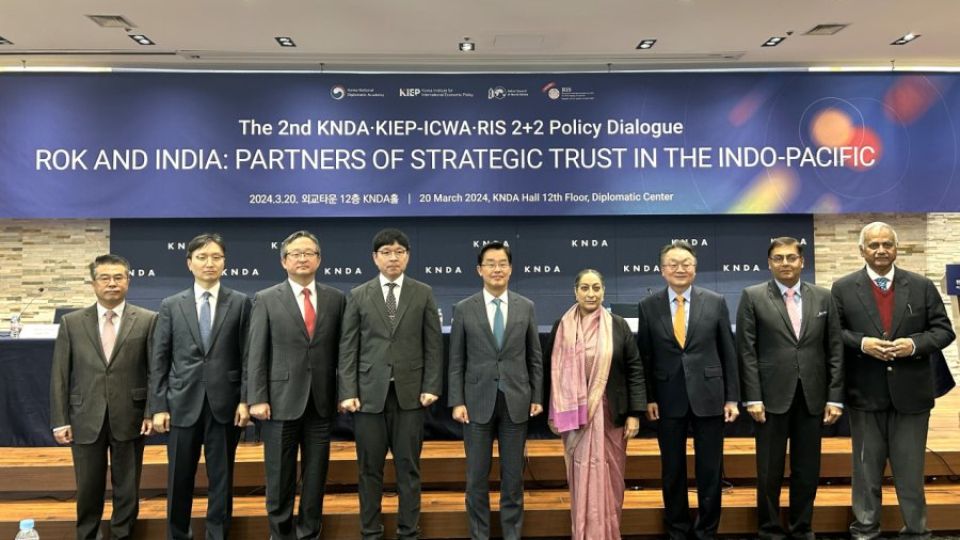March 28, 2024
SEOUL – South Korea and India should amplify their cooperation across economic, technology, defense and security domains, particularly amidst mounting global uncertainties fueled by ongoing wars in Ukraine and the Middle East and the intensifying US-China strategic competition, experts from the two countries said Wednesday.
The significance of enhancing bilateral collaboration serves as a crucial avenue to maintain peace and security in the Indo-Pacific region and ensure economic security including stable supply chains, experts emphasized during the second 2+2 policy dialogue between South Korean and Indian research institutes in Seoul.
“In essence, Korea and India share a lot of common qualities and external orientations, so the two countries are wonderful partners to work within a world of uncertainty, instability, and fluidity.” Park Cheol-hee, chancellor of the Korea National Diplomatic Academy, said in his opening speech.
Park emphasized the commonalities shared by the two nations, including democratic governance, resilient market systems, respect for human rights and the rule of law, and an open outward orientation to the international community.
Park listed 10 critical areas for Seoul and New Delhi to cultivate together: cooperation on maritime security in the Indo-Pacific; cybersecurity; defense industry cooperation; joint investment in climate change and environmental protection; medical and biochemical development; partnership in the Global South; working for new rules and norms in international institutions; capacity building for ASEAN countries and the Pacific islands; prevention of illegal fishing and piracy; and fostering people-to-people exchanges.
The meeting brought together experts from the KNDA and the Korea Institute for International Economic Policy, alongside representatives from the Indian Council of World Affairs and the Research and Information System for Developing Countries, both headquartered in New Delhi.
The meeting was titled “Republic of Korea and India: Partners of Strategic Trust in the Indo-Pacific,” referring to South Korea as its official name.
South Korean Deputy Foreign Minister of Political Affairs Chung Byung-won also outlined three areas of focus, emphasizing the growing cooperation in the fields of economic security and defense industry such as the K9 Vajra project.
“First of all, Korea and India should work together to promote freedom in the region and more broadly,” Chung said in his welcoming remarks, calling for partnership to strengthen the rule-based regional order.
“Secondly, Korea and India should promote peace and stability in the region and beyond.”
Chung emphasized the need to foster active bilateral defense and defense industry collaboration to enhance cooperation on regional security, including North Korea, cyber security, maritime security and nonproliferation.
“Lastly, Korea and India should promote mutual prosperity and contribute to global economic development.”
Chung explained that economic cooperation is crucial and serves mutual interests, given the complementary nature of the two economies and India’s increasing significance as a global supplier.
Vijay Thakur, director general of the Indian Council of World Affairs, underscored the importance of deepening cooperation between South Korea and India amidst disruptions in global supply chains.
“We are, of course, meeting at a time when the global landscape is witnessing stresses and strains, uncertainty, and fluidity,” Thakur remarked, pointing to US-China contestations, a fractured world, and ongoing wars in Ukraine and the Middle East as examples.
Disruptions in the supply chains of food, energy and fertilizer have been observed, negatively impacting both the global South and global economic growth since the COVID-19 pandemic and subsequent events such as the wars.
“Furthermore, the weaponization of economic and financial instrumentalities has added to deep distrust. This has necessitated the search for trusted and reliable supply chains,” Thakur said, highlighting overconcentration of production in a single country or region highlights the necessity for diversification.
“So in this context, we look forward to deeper economic engagement between India and the ROK,” Thakur added.
Thakur also stressed India’s commitment to expanding bilateral technology cooperation, encompassing areas from semiconductors and chips to broader emerging fields such as artificial intelligence.
“We know that technologies have to be built on the basis of dependable partnerships.”
Thakur also highlighted the importance of South Korea in the context of India’s foreign policy, which is characterized by strategic autonomy, emphasizing the nation’s stance on issues aligned with its national interests, values and the promotion of global welfare.
“This translates into India seeking partnerships across the world without being an ally of any country. At the same time, it entails building stronger partnerships with countries with whom it has strategic trust and shared values,” she said. “In this context, we look at ROK as such a partner.”
Seshadri Chari, member of the Governing Council of the Research and Information System for Developing Countries, emphasized that bilateral cooperation in maritime security is essential, given that both India and South Korea heavily rely on intra-regional sea lanes for communication and transportation.
Over 77 percent of India’s foreign trade is transported via sea, while over 90 percent of South Korea’s energy imports and 30 percent of its total exports traverse the Indo-Pacific maritime transport corridor, according to him.
“Therefore, strengthening the India-South Korea partnership in the region and in Indo-Pacific is of strategic importance for both economies,” Chari said during a session, noting South Korea’s counter-piracy operations in the Gulf of Aden as a “very valuable experience to share with India for the security of Indo Pacific region.”
Chari underscored that India and South Korea can “become useful and successful partners in the emerging new world order” by collaborating to address challenges and improve conditions in the Indo-Pacific region with a “cooperative security and economic architecture.”
“We have more solutions than challenges.”


